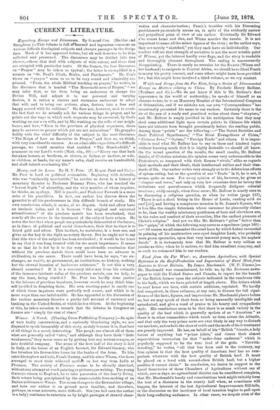Money, and its Laws. By H. V. Poor. (C. Kegan
Paul and Co.)— Mr. Poor is hard on political economists. Beginning with Aristotle, who was "eminently unscientific," he carries us down in a history of monetary theories to Professor Bonamy Price, who has touched the " lowest depth " of absurdity, and the very mention of whom requires, he thinks, an apology. Mill is puerile, and Professor Fawcett is a more echo of his puerilities. In fact, our author has thrown down the gauntlet to all his predecessors in this difficult branch of study. His own conclusions admit, it seems, of no dispute. Gold and silver have an intrinsic value, and it is because " the original and universal attractiveness" of the precious metals has been overlooked, that nearly all the errors in the treatment of the subject have arisen. He notes the fact that when people are particularly distrustful of the future, as in times of political and social disturbance, their first instinct is to hoard gold and silver. This instinct, be maintains, is a true one, and gives us the key to the right monetary theory. But he ought not to say that this view of the subject has been overlooked ; it would be far truer to say that it was long treated with far too much importance. It seems to us that he is led by it to the very questionable conclusion that without the precious metals there could have been no advance to civilisation, in one sense. There could have been, he says," no ex- changes, no wealth, no government, no institutions, no history, nothing but the eternal iteration of barbarous existence." Is not this a very absurd assertion ? If it is a necessary inference from his estimate of the immense intrinsic value of the precious metals, can we help, to say the least, being startled ? Mr. Poor has hardly done justice to tho labours of previous inquirers, however much he may think him- self justified in despising them. His own starting-point is surely one of which those inquirers were perfectly well aware, and which is in more ways than one indefensible. He has appended to his discussion of the various monetary theories a pretty full account of currency and banking in the United States, of which he is a citizen. At the beginning of this, he takes occasion to remark that the debates in Congress on finance are " simply the roar of chaos."


































 Previous page
Previous page